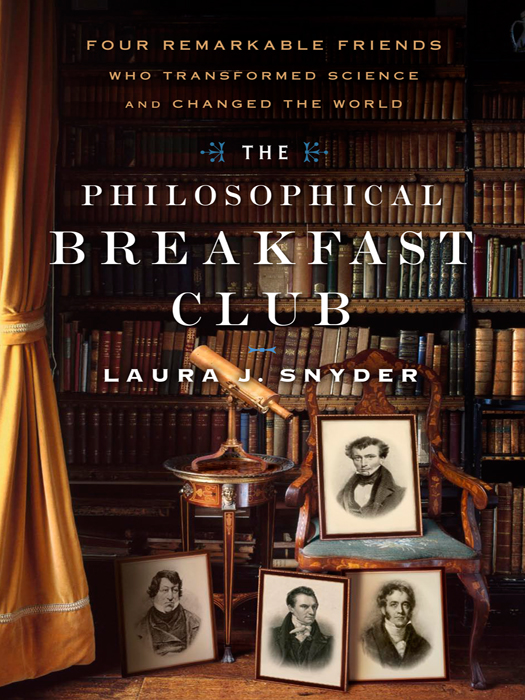
The Philosophical Breakfast Club
Four Remarkable Friends Who Transformed Science and Changed the World
کتاب های مرتبط
- اطلاعات
- نقد و بررسی
- دیدگاه کاربران
نقد و بررسی

December 13, 2010
A Victorian science expert at St. John’s University, Snyder offers a four-in-one biography of 19th-century scientists William Whewell, a polymath whose expertise ranged from geology to moral philosophy; Charles Babbage, credited with inventing the first computer; John Herschel, a noted astronomer and mathematician; and Richard Jones, who created the academic discipline of economics. In 1812, when academic science was still a backward field, the four Cambridge students founded the Philosophical Breakfast Club, devoted to scientific discussion. Snyder provides insights into their personal lives, their myriad professional accomplishments, and their influence on science and economics. She underscores the importance of their accomplishments by placing them into modern context, for example, pointing out that Jones’s empirically based economics, which placed economics in a larger social and political context, is in vogue again. Snyder also describes Whewell’s important integration of religion and Darwinism. Each of the four figures is a worthy subject in his own right, and by combining their stories Snyder provides the right balance of biography and science. It also allows Snyder to discuss a wide range of scientific developments that are sufficiently modern to appeal to today’s readers.

December 1, 2010
Snyder (Philosophy/St. John's Univ.; Reforming Philosophy: A Victorian Debate on Science and Society, 2006) shows how four British "natural philosophers" helped launch modern science.
Lifelong friends since 1813, when they were students at Cambridge University, the scientists—William Whewell, Charles Babbage, John Herschel and Richard Jones—shared a belief in the importance of precise measurement and calculations as the basis for the scientific method and advocated public support for science. The author makes a convincing case that not only did each of these men make important individual contributions—Whewell became the master of Trinity College, Cambridge; Herschel mapped the southern skies; Babbage invented the first computer; Jones was a pioneer in developing statistical economics—but together they played a vital role in transforming science. One of the group's running debates—on the role of God in the evolution of new species—was influential in helping Darwin formulate the theory of natural selection. The breakfast club where they met regularly at Cambridge to discuss their ideas led 20 years later to the formation of the British Association for the Advancement of Society, which they helped found. In 1833, Whewell chaired its third meeting and in response to an attack from the Romantic poet Coleridge—who derided its members as mere experimenters "digging in fossil pits, or performing experiments with electrical apparatus"—coined the term "scientist" as a replacement for "natural philosophers." The much older Royal Society continued to exist, but its meetings were poorly attended. On the other hand, BAAS meetings, a forerunner of modern scientific conferences, drew thousands and shaped the direction of science, opening their meetings to the broader public and reintroducing debate, which had been banned by the Society since the days of Newton.
The author skillfully weaves together the lives of her four principals with the science of their day.(COPYRIGHT (2010) KIRKUS REVIEWS/NIELSEN BUSINESS MEDIA, INC. ALL RIGHTS RESERVED.)

February 1, 2011
Imagine a period when financially independent men practiced science as a hobby for curiosity's sake alone yet remained experts across many disciplines and made significant discoveries. Moreover, what they did was not really science but natural philosophy. This is where science philosopher Snyder (philosophy, St. John's Univ.; Reforming Philosophy: A Victorian Debate on Science and Society) begins her tale of how four men changed science in the early 19th century. A breakfast club brings together Cambridge University students William Whewell, Charles Babbage, John Herschel, and Richard Jones, who commit to make science Baconian, or inductive; in practice, science should be demonstrated through experimentation and useful to our daily lives. Snyder explores the tour de force that led to a science more as we know it today: occupational, government-financed research, women scientists, applied sciences, and international scientific collaboration. VERDICT An accessible and engaging read on the origins of Victorian science, its personalities, and the cultural contribution made by these four men, this will appeal to readers interested in Victorian science, biographies, astronomy, chemistry, the religion vs. science debate, Darwin, computers, and a smorgasbord of related sciences.--Scott Vieira, Johnson Cty. Lib., KS
Copyright 2011 Library Journal, LLC Used with permission.

February 15, 2011
When Coleridge complained in 1833 that a man digging for fossils or experimenting with electricity did not deserve the title natural philosopher, physicist William Whewell responded by coining a new word: scientist. Behind this coinage, Snyder discerns a cultural revolution, one that Whewell had helped to launch in a series of Cambridge breakfast meetings with three classmates: Charles Babbage, John Herschel, and Richard Jones. Together these four mapped out a plan for perfecting the scientific method and harnessing it for social benefit. Snyder chronicles the subsequent collaboration of these breakfast visionaries: Whewell mapped ocean tides; Babbage designed the first computer; Herschel pioneered photographic technology; Jones translated economics into rigorous mathematics. Collectively, this band forged an identity for the scientist and thus cleared cultural space for Darwin and James Clerk Maxwell. Snyder, however, also recognizes the irony in the professional narrowing inherent in this new identity, since the daring four who established it claimed horizons too broad to fit within its limits. A striking account of how a few bold individuals catalyzed profound social change.(Reprinted with permission of Booklist, copyright 2011, American Library Association.)

























دیدگاه کاربران